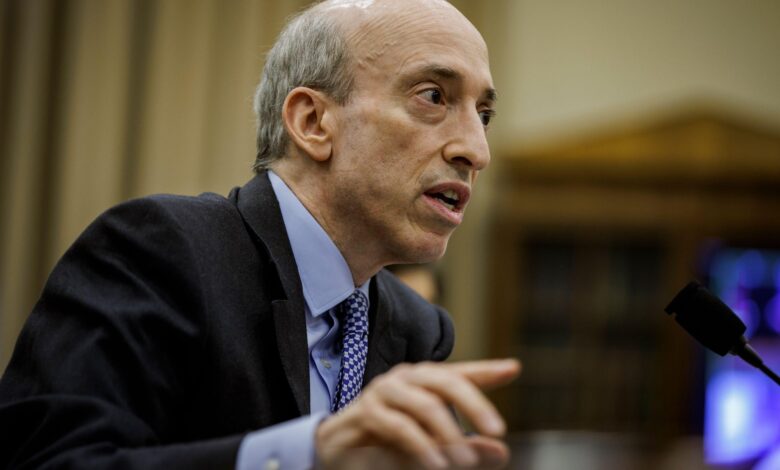US ambitions are a fork in the road for GCC crypto


Samuel Corum/CNP via Reuters Connect
Donald Trump has returned to the White House with some big promises to reshape the global cryptocurrency landscape.
After years of regulatory uncertainty under both Democratic and Republican administrations, Trump has pledged to protect bitcoin ownership and encourage blockchain innovation.
If these promises materialise into tangible policy the US could become a global centre for digital assets.
The UAE, Saudi Arabia and Bahrain have been at the forefront of crypto regulation, creating regulatory sandboxes that have attracted international players. Dubai’s Virtual Asset Regulatory Authority has positioned itself as a global leader by balancing innovation with investor protection.
These efforts have helped the region’s crypto market grow. The Mena region received $339 billion in crypto assets between July 2023 and June 2024, according to a report by Chainalysis.
While the US has long been a dominant player in financial services, it has taken an inconsistent approach to crypto regulation.
Under Gary Gensler, the US Securities and Exchange Commission aggressively pursued enforcement actions against exchanges and token issuers, contributing to uncertainty that has driven some crypto companies offshore.
If Trump follows through on deregulation, the US could emerge as a serious competitor to the Gulf, providing the legal certainty and institutional backing that many digital asset companies seek.
Unlike past Republican leaders who have largely been indifferent to crypto, Trump has actively courted the industry. During his 2024 campaign, he made direct appeals to crypto investors, accepting bitcoin donations and vowing to end what he called the Biden administration’s “war on crypto”.
His close relationships with tech moguls including Elon Musk, whose ventures have significant crypto interests, also indicate that a Trump administration is likely to adopt a more favourable regulatory stance.
US lawmakers from both major parties have already introduced legislation aimed at easing crypto regulations and Trump’s liking for deregulation makes it plausible that he will push forward policies to legitimise digital assets as a mainstream financial tool.
US-Gulf rivalry or collaboration?
The main question for Gulf crypto leaders is whether a crypto-friendly US could challenge their current advantages. While the UAE and Saudi Arabia have cultivated regulatory certainty, the US has the capital markets, financial institutions and technological infrastructure to quickly become a dominant player.
A more permissive US regulatory environment may attract capital and talent away from the Middle East, particularly if major financial institutions in New York and Silicon Valley gain greater freedom to participate in crypto markets.
However, regulatory credibility takes time to build. The UAE and Saudi Arabia have spent years cultivating relationships with global financial players, ensuring compliance with international anti-money laundering and counter-terrorist financing standards.
The UAE has already established itself as a jurisdiction of choice for crypto-friendly banking, with a growing ecosystem of exchanges, institutional investment firms and blockchain-based infrastructure projects.
If the US loosens regulations, Gulf regulators could position themselves as partners rather than competitors, fostering cross-border collaboration on compliance frameworks and institutional adoption.
One possible scenario is the development of regional specialisations: the US could become the primary trading and investment centre for crypto, while the Gulf states retain their lead in regulatory innovation, tokenisation of real-world assets and integration of blockchain into traditional finance.
Dubai’s financial free zones and Abu Dhabi’s Global Market have already facilitated institutional crypto adoption in a way that US regulators have struggled to match.
Meanwhile, Saudi Arabia’s Public Investment Fund has shown interest in Web3 investments, indicating that the kingdom could focus on blockchain applications beyond financial markets.
Trump’s embrace of crypto could be driven as much by political expediency as by genuine belief in the technology. Although he is currently taking a pro-crypto stance, any major deregulation push in the US could be subject to abrupt reversals if political winds shift.
While a Trump-led US may attempt to position itself as the new home for crypto, it remains to be seen whether American regulators will adopt a coherent and stable framework. Trump’s unpredictability and the likelihood of political opposition from within Congress could also delay or complicate regulatory shifts.
Rather than viewing Trump’s potential pro-crypto policies as a threat, Gulf states could exploit their existing regulatory head start to carve out a complementary role.
Carla Sertin is AGBI technology editor
Source link



